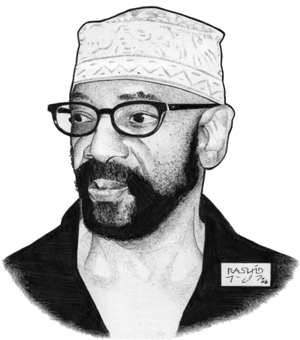Russell Maroon Shoatz, Rest in Power
 It is with great sadness, anger, and bitterness, that i have learned of the passing of Russell Maroon Shoatz.
It is with great sadness, anger, and bitterness, that i have learned of the passing of Russell Maroon Shoatz.
A prisoner of war for most of his life, Maroon came to symbolize not only the cruelty of the u.s. prison system, but also the indomitable spirit of resistance.
In the 1960s Maroon became active in the Black Liberation Movement, being one of the founding members of the Black Unity Council which would eventually merge with the Philadelphia chapter of the Black Panther Party in 1969.
As the Black Panther Party was targeted for intense government repression, and suffered due to its own internal divisions, Maroon was one of those who joined the underground. In 1970, along with five others, Maroon was accused of attacking a police station, which resulted in an officer being killed. This attack was carried out in response to the rampant police brutality in the Black community. For 18 months Maroon functioned underground as a soldier in the Black Liberation Army, until his capture in 1972.
Of the forty nine years since, Maroon spent over twenty in the “holes” of various prisons, locked down for 23 or more hours daily. Twice he escaped – once in 1977 and again 1980 – but both times he was recaptured. Maroon became president of the Pennsylvania Association of Lifers and was lobbying lawmakers to repeal sentences of life without parole in 1983, when he was placed in solitary for several years. In 1991, he was again placed in solitary for over 22 consecutive years until successfully completing a “step-down” program in 2014. In 2016, Maroon won a $99,000 settlement and a permanent reprieve from solitary in a case that challenged Pennsylvania’s use of this cruel and unusual punishment.
While incarcerated Maroon developed cancer; any care he received in prison was only as a result of struggle. Indeed, the Pennsylvania prison system knowingly allowed his medical conditions to worsen to an irreversible point. Finally, in late October of this year, at the age of 78, and as a result of an ongoing outside support campaign, Maroon was granted compassionate release. He was immediately transferred to a hospice. He passed away at his sister’s home 52 days later, surrounded by the love and care of his family.
Condolences to Maroon’s family, friends, and comrades.
To learn more:
- Rest easy, and in power. Long live Russell Maroon Shoatz., Abolitionist Law Centre
- “Former Black Panther Russell ‘Maroon’ Shoatz Freed From Prison After 49 Years” by Mike Ludwig, Truthout (10/26/21)
- “Compassionate release for Maroon” by Betsy Piette, Workers World (10/25/21)
Leave a Reply